Eights Week
| Summer Eights | |
| Head of the River | |
| Oriel College Men[1] | Christ Church Women[1] |

|

|
| Highest 2nd Eight (Men) | Oriel College (Division II) [1] |
| Highest 2nd Eight (Women) | Wolfson College (Division II) [1] |
| Course | Isis (upstream) |
| Course length | c. 1800m |
| Note: Last Eights 22 May – 25 May 2024 | |
| OURCs - Summer Eights | |
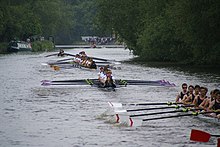
Eights Week, also known as Summer Eights, is a four-day regatta of bumps races which constitutes the University of Oxford's main intercollegiate rowing event of the year. The regatta takes place in May of each year, from the Wednesday to the Saturday of the fifth week of Trinity Term. Men's and women's eights compete in separate divisions for their colleges.
Overview


The racing takes place on the Isis, a length of the River Thames, which is generally too narrow for side by side racing. For each division, twelve boats line up at the downstream end of the stretch, each cox holding onto a rope attached to the bank, leaving around 1.5 boat lengths between each boat. The start of racing is signalled by the firing of a cannon, each crew attempting to progress up their division by bumping the boat in front, while avoiding being bumped by the boat behind. Once a bump has taken place, both of the crews involved stop racing and move to the side to allow the rest of the division to pass. It is possible to "over bump" if the 2 crews in front of your boat bump (and so drop out) and your boat can catch the boat that was in front of them. They then swap places for the next day's racing, whether that be the calendar day or the first day of racing in the next year's competition.[2]
The ultimate aim of a crew is to become "Head of the River" (top of the first division) and stay there. This entitles the winning crew to commission trophy oars in their college colours with the names and weights of the successful crew on them — commonly called "winning blades". As this is only possible for crews already near the top of division one, another way to win blades is to bump on each day of the competition.[3]
The "Double Headship" is an accolade awarded to any college finishing with both their men's and women's crews at the "Head of the River" in their respective divisions. This feat has only ever been achieved once, by Pembroke College in 2003. A silver "Double Headship Trophy" was commissioned from the silversmith Peter Musson in 2003, to commemorate the historic occasion.[4]
History
Although regular races between professional watermen had been known since 1715 when Doggett's Coat and Badge was instituted, amateur racing was unknown before 1808.[5] Meanwhile, recreational rowing had begun in Oxford very much earlier, with students rowing in single wherries at least as early as 1769.[6]
The first amateur races between organised clubs which prepared and trained for the event began in Oxford in 1815. In this year, crews from Brasenose College and Jesus College raced for the Head of the River, from Iffley Lock to Mr King's Barge, which was moored near the current Head of the River hotel. The event is also notable for the fact that both crews rowed in eight oared boats, specially built for the purpose. Such recreational as occurred at this time was usually conducted in pairs, or four or six oared cutters. The fact the racing was conducted in eight oared boats gave rise to the event being known as Eights.[7]
Brasenose College and Jesus College recontested the event in 1816, with Brasenose again triumphing. Christ Church joined in the event from 1817, when they went Head, a position they retained until 1819.[8]: 289 Christ Church did not row in 1820. The next recorded races, between Brasenose and Jesus, were in 1821 and 1822. A dispute about professional watermen being allowed in college crews precluded racing in 1823. Until this time, Jesus and Brasenose had each used paid coaches who rowed in the stroke seats of the crews.[9]
From 1824, Christ Church and Exeter College began racing, with Exeter going Head in that year. A rule banning the use of "out college men" (i.e. men from other colleges) rowing in college crews saw the entry of Worcester College in 1825, University and Balliol Colleges in 1827, and Oriel and Trinity Colleges in 1828.[8]: 317
During the Covid-19 pandemic in 2020, Summer Eights were cancelled for the first time since the Second World War. In the year after, Summer Eights were replaced by Summer Torpids, which was held instead because the 2021 Torpids races were also cancelled due to the pandemic response. Both Summer Eights and Torpids resumed as regular in 2022, using the college rankings from the end of 2019. In 2023, the Brasenose-Peter's composite crew became the first composite crew to qualify in the history of Summer Eights as well as the first to ever get a bump.
Head of the River – Summary table (excluding World War 2 races)
| Blade | College | Men | Women | Headships[10] | Longest time held - Men | Longest time held - Women | Last Headship – Men | Last Headship - Women |
|---|---|---|---|---|---|---|---|---|
| Oriel | 35 | - | 35 | 1978–84 & 1996–2002 | - | 2023 | - | |
| Christ Church | 33 | 1 | 34 | 1828–32 | 2023-24 | 2017 | 2024 | |
| Brasenose | 24 | - | 24 | 1888–91 & 1928–31 | - | 1931 | - | |
| Magdalen | 20 | - | 20 | 1892–95 & 2004–07 | - | 2007 | - | |
| New College | 16 | 2 | 18 | 1896–99 | 2004–05 | 1986 | 2005 | |
| University | 13 | 1 | 14 | 1896–99 | - | 1991 | 2022 | |
| Trinity | 13 | - | 13 | 1869–71 | - | 1949 | - | |
| Balliol | 10 | 2 | 12 | 1859–60 & 1955–56 | 2010–11 | 2008 | 2011 | |
| Pembroke | 4 | 6 | 10 | 2013 | 2000–03 | 2013 | 2018 | |
| St Edmund Hall | 5 | 4 | 9 | 1959–61 | 2006–09 | 1965 | 2009 | |
| Keble | 8 | - | 8 | 1967-1970 | - | 2018 | - | |
| Somerville | - | 8 | 8 | - | 1990–93 | - | 1993 | |
| Wadham | 2 | 6 | 8 | - | 2014–17 | 1856 | 2017 | |
| Exeter | 7 | - | 7 | 1882-84 | - | 1884 | - | |
| Osler Housea | - | 5 | 5 | - | 1988–89 & 1994–95 | - | 1995 | |
| Osler-Greenb | - | 4 | 4 | - | 1996–99 | - | 1999 | |
| St Hugh's | - | 4 | 4 | - | 1982–84 | - | 1984 | |
| Queen's | 3 | - | 3 | - | - | 1957 | - | |
| Corpus Christi | 2 | - | 2 | - | - | 1885 | - | |
| Hertford | 1 | - | 1 | - | - | 1881 | - | |
| Lady Margaret Hall | - | 1 | 1 | - | - | - | 1977 | |
| Merton | 1 | - | 1 | - | - | 1951 | - | |
| St John's | - | 1 | 1 | - | - | - | 2013 | |
| Wolfson | - | 1 | 1 | - | - | - | 2019 |
| a Since 2008 this crew composition does not exist any more. Prior to the foundation of Green Templeton College members of Green College raced with Osler House whereas members of Templeton College raced with Hertford College.[citation needed] |
| b Prior to the composite crew with Green College and after the foundation of Green Templeton Boat Club, Osler raced as an independent crew formed of clinical medical students.[citation needed] |
Head of the River – Men
Summer Eights has been held since 1815.[14][15]
No racing occurred during World War I. In World War II, though college rowing continued, there were insufficient students for normal racing between colleges to be maintained. As a consequence, most colleges competed in composite clubs, and the number of crews competing was greatly curtailed. After the war, normal racing continued, and in 1946 college crews started in the order in which they finished in 1939.[16]



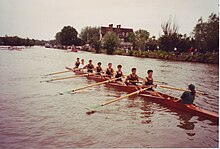
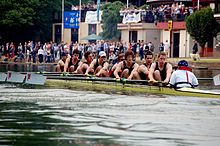


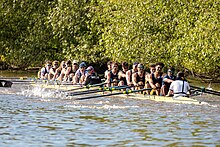
| a Unknown whether any racing occurred[14] |
| b No racing took place owing to a dispute over whether professional watermen were legitimate crew members[14] |
| c No racing owing to the first varsity boat race[17] |
| d No racing owing to World War I |
| e No racing owing to World War II |
| f No racing owing to the COVID 19 Pandemic |
| g No racing owing to the postponement of Torpids to Trinity Term caused by the COVID 19 Pandemic |
Head of the River – Women
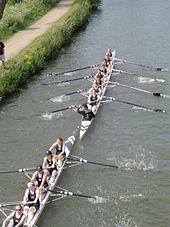

| Year | College | Year | College | Year | College | Year | College | Year | College |
|---|---|---|---|---|---|---|---|---|---|
| 1976 | 1977 | 1978 | 1979 | 1980 | |||||
| 1981 | 1982 | 1983 | 1984 | 1985 | Osler House | ||||
| 1986 | 1987 | 1988 | Osler House | 1989 | Osler House | 1990 | |||
| 1991 | 1992 | 1993 | 1994 | Osler House | 1995 | Osler House | |||
| 1996 | Osler-Green | 1997 | Osler-Green | 1998 | Osler-Green | 1999 | Osler-Green | 2000 | |
| 2001 | 2002 | 2003 | 2004 | 2005 | |||||
| 2006 | 2007 | 2008 | 2009 | 2010 | |||||
| 2011 | 2012 | 2013 | 2014 | 2015 | |||||
| 2016 | 2017 | 2018 | 2019 | 2020 | - a | ||||
| 2021 | - b | 2022 | 2023 | 2024 | 2025 |
| a No racing due to the COVID-19 Pandemic |
| b No racing due to the postponed of Torpids to Trinity Term caused by the COVID-19 Pandemic. |
See also
- May Bumps, the equivalent event in Cambridge.
- Torpids, a similar event in Hilary Term.
References
- ^ a b c d Anu Dudhia, Eights 2022, retrieved 28 May 2022
- ^ "OURCs: Historical Eights Results". ourcs.co.uk. Retrieved 21 July 2024.
- ^ "Oxford Bumps". bumps.live. Retrieved 21 July 2024.
- ^ Peter Musson.
- ^ Norfolk Chronicle, 16 July 1808.
- ^ Jackson's Oxford Journal, 25 March 1769.
- ^ O'Chee, W.G. (4 February 2015). "Brasenose College and the Origins of Oxford rowing". Archived from the original on 6 February 2015. Retrieved 6 February 2015.
- ^ a b Woodgate, W.B. (1888). Boating. Longmans, Green, and Co. Retrieved 1 April 2021.
- ^ "Oxford Bumps Charts". eodg.atm.ox.ac.uk. Retrieved 21 July 2024.
- ^ "Number of Headships".
- ^ a b c "Oxford Bumps". bumps.live. Retrieved 21 July 2024.
- ^ a b c "OURCs: Historical Eights Results". ourcs.co.uk. Retrieved 21 July 2024.
- ^ a b c "Eights 2024". eodg.atm.ox.ac.uk. Retrieved 21 July 2024.
- ^ a b c Sherwood, W.E. (1900). The Eights. Oxford and London: Henry Frowde. p. 109. Retrieved 30 May 2017.
- ^ O'Chee, W.G. (4 February 2015). "Brasenose College and the Origins of Oxford rowing". Archived from the original on 6 February 2015. Retrieved 6 February 2015.
- ^ O'Chee, W.G. (26 January 2018). "Rowing's Continuation and Resilience in Wartime Oxford". Retrieved 1 April 2021.
- ^ "Eights 1829". eodg.atm.ox.ac.uk. Retrieved 28 May 2017.

